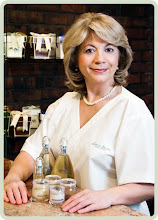Welcome to LaVie Organique's blog! Here, you'll find information and updates about LaVie Organique products, Lavinia Borcau Skin Care, and general tips on improving your skin's health and beauty.
Read on for the story behind the LaVie Organique line:
Lavinia Borcau believes that skin care is a lifetime discipline, and that an effective skin care routine achieves and maintains balance, supporting the health and beauty of your skin.
With over 20 years in the business, a successful salon, and her desire to increase the effectiveness of daily personal skin care and overall wellness, she has spent the last 4 years perfecting a line which brings together the natural wisdom of our grandmothers’ heritage with the secrets of European skin care and modern scientific technology.
Lavinia Borcau has done what few skin care professionals have done: she has launched a product line that has its roots in time-tested approach from her native Romania, a region renowned for centuries for its spas, treatments, and skin care.
Lavinia Borcau’s new
LaVie Organique product line is the expression of a lifetime’s experience of hands-on professional skin care, and of Lavinia’s sophisticated knowledge of what wonderful skin care products can achieve for her clients.
Lavinia Borcau obtained the CIDESCO International Diploma in 1994 – the highest earned professional skin care title in the world. She has dedicated more than 20 years of experience to the field, and is passionately committed to providing the highest quality of skin care. She owns and operates Lavinia Borcau Skin Care in Boston.
Lavinia can be contacted at info@lavie-organique.com.
Days before the launch of LaVie Organique, the web site, www.lavie-organique.com went live. The creation of the LaVie Organique web page has been a project in itself, as Lavinia’s desire for full disclosure of all the ingredients in her proprietary formula led to the creation of a “Science Library,” the section of the site where all the herbal, mineral, and other natural ingredients are discussed.
On Wednesday, February 11, the launch of LaVie Organique was celebrated with a party at Lavinia Borcau Skin Care, 29 Harvard St. in Brookline. We enjoyed seeing all our friends gathered to celebrate the occasion with wine and hors d’oeuvres, and even live musical accompaniment. While our estheticians gave free mini-facials using the new LaVie Organique products, Lavinia shared with guests her long path leading to the creation of LaVie Organique, driven by her desire not to compromise the efficacy of her products while also maintaining the highest standards of
natural skin care, without the use of parabens or synthetic preservatives.
Please visit the LaVie Organique blog often - we're excited to share our products and knowledge with you!
Labels: Lavie Organique product line, Lavinia Borcau, natural skincare, organic skin care, skin care products














